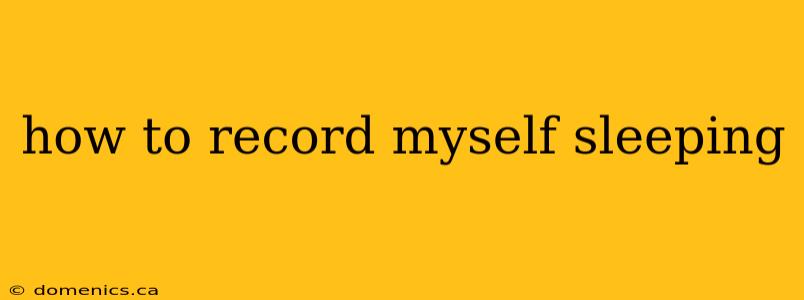Introduction
Want to understand your sleep patterns better? Recording yourself while you sleep can offer valuable insights. This guide provides safe and effective methods for monitoring your sleep, whether for personal curiosity or to address potential sleep disorders. Remember, consulting a sleep specialist is crucial if you suspect a sleep problem. This article focuses on methods for recording yourself, not diagnosing sleep issues.
Why Record Your Sleep?
Monitoring your sleep can be beneficial for several reasons:
- Identify Sleep Disorders: Suspect sleep apnea, restless legs syndrome, or other disorders? Recording can help illustrate symptoms to your doctor.
- Track Sleep Patterns: Observe your sleep stages, identify potential disruptions (like sleepwalking), and understand how long it takes you to fall asleep.
- Improve Sleep Hygiene: See how your sleep environment and pre-sleep routines affect your sleep quality. Make adjustments for better rest.
- Reduce Anxiety Around Sleep: For some, recording can alleviate anxiety about sleep quality by providing concrete data.
Important Note: This article is for informational purposes only and does not replace professional medical advice. Always consult a doctor before making significant changes to your sleep routine or if you have concerns about your sleep health.
Methods for Recording Yourself Sleeping
Several methods allow you to record your sleep, each with its pros and cons:
1. Using Your Smartphone
- Pros: Convenient, readily available, many apps offer sleep tracking features.
- Cons: Battery life can be an issue. Phone placement needs to be considered for optimal recording. Audio quality may be less precise than dedicated devices.
How-to: Many sleep tracking apps utilize your phone's microphone and sensors to monitor sleep stages and patterns. Position your phone near your bed, ideally on a stable surface. Ensure it's charged and won't disturb your sleep.
2. Dedicated Sleep Trackers
- Pros: Designed specifically for sleep monitoring, often provide more detailed data than smartphones.
- Cons: Requires purchasing additional equipment, may not be as readily available.
How-to: Follow the manufacturer's instructions for setup and placement. These devices often use a combination of sensors to track various aspects of your sleep.
3. Video Recording (with Caution!)
- Pros: Can visually capture sleep behaviors like sleepwalking or sleep talking.
- Cons: Requires more advanced setup, privacy concerns must be carefully addressed. Can be unsettling to review.
How-to: Use a camera (preferably one with night vision) and position it discreetly to capture your sleep without compromising your privacy. Securely mount it to avoid accidents. Review recordings cautiously, focusing on relevant behavioral patterns.
4. Using a Smartwatch or Fitness Tracker
- Pros: Often includes sleep tracking as a built-in feature, convenient to wear.
- Cons: Accuracy may vary compared to dedicated sleep trackers. Data may be less comprehensive.
How-to: Ensure your device is correctly synced and charged before bed. Most fitness trackers and smartwatches automatically track sleep data.
Analyzing Your Sleep Recordings
Once you've recorded your sleep, analyze the data collected. Look for patterns:
- Sleep Latency: How long does it take to fall asleep?
- Sleep Duration: How many hours of sleep do you get?
- Sleep Stages: Are you spending enough time in deep sleep?
- Sleep Disruptions: Are there any significant interruptions during the night?
Addressing Potential Sleep Problems
If your recordings reveal significant sleep disruptions or symptoms of a sleep disorder, consult a sleep specialist or your doctor. They can provide a proper diagnosis and recommend appropriate treatment.
Conclusion
Recording yourself sleeping can be a valuable tool for understanding your sleep patterns and identifying potential problems. Choose the method that best suits your needs and remember that respecting your privacy and consulting healthcare professionals when needed are paramount. Using this information responsibly will help you gain insights into your sleep health and improve your overall well-being.
